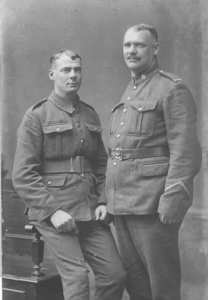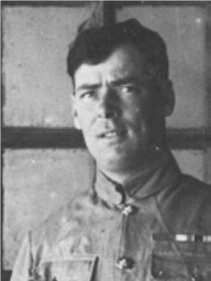military career
|
First World War 1914-1918 |
My grandfather, Charles Frederick Langley was born in the Kentish Town area of London, England in 1889. After leaving school he went into the timber trade and worked as a sawyer. He moved to Derby with his mother and sister (around 1900) and during this time he met my grandmother, Mabel Wheatley. They were married on Christmas Day 1908. |
 |
He enlisted into the army on 30th November 1914 at Normanton Barracks, Derby, joining the 4th Battalion Sherwood Foresters, Notts & Derby Regiment (Private No. 20250).
Having been injured in the early part of the war he was demobbed on the 20th February 1915 and returned to his job at Rolls Royce but in June 1916 he re-enlisted and joined the Household Battalion ( Trooper No.2808 ) at Knightsbridge Barracks, London. The battalion was moved to France on the 9th November 1916 and on 17th November was attached to the 10th Brigade, 4th Division.
My Grandfather arrived in France on the 15th July 1917, joining No. 2 Company, the Battalion being in the front line near Rouex. He was just in time for the start of the
3rd Battle of Ypres or 'Passchendaele'.
(Pictured Left)
Charles Langley (left) with his older brother. |
During the course of the battle he would be awarded the Distinguished Conduct Medal for his brave actions on the morning of 12th October 1917, at Requete Farm, near Poelcapelle, along with Corporal of Horse H.T. Bishop, including taking an enemy pill-box and over twenty German prisoners.
On the 10th February 1918 the Household Battalion was disbanded and my grandfather was then transferred on the 6th March 1918 to the 3rd Battalion, Grenadier Guards ( Guardsman No. 30575 ) which was part of the Guards Division. After becoming ill with Bronchitis he was hospitalized in Rouen before being shipped back to a hospital in Edinburgh on the 30th May 1918, he was in hospital for over a month. On discharge from hospital he was then transferred to the 5th Reserve
Battalion, Grenadier Guards at Wellington Barracks, London.
He was presented with his D.C.M. by the Mayor of Derby at a presentation evening at the Hippodrome Theatre, Derby on 30th September 1918.
He was eventually demobbed and placed on the Army Reserve list on the 10th February 1919. He was awarded an Army Pension of 6d a week at the end of February 1919.
|
India - North West Frontier 1920-1923
|
Having left the army in February 1919 my grandfather then had the bright idea of joining the Royal Air Force, enlisting in September 1919. After basic training at RAF Henlow he emerged as an Aircraftsman 2nd Class and in late October 1919 he was posted to the jewel of the British Empire, India, arriving aboard the troopship S.S. Nore.
On arrival in Bombay he then found himself enroute to the trouble spot of the North West Frontier where the British were involved in numerous conflicts with the local tribesmen, mainly the Pathans and Waziri's. His final destination turned out to be the RAF base at Risalpur, this was to be the new home for 27 Squadron.
|
A carpenter by trade my grandfather was also in charge of the bases three pigeon lofts containing several hundred birds and one of his jobs was to teach the pilots how to handle and release the homing pigeons from the aircraft. His love for keeping pigeons remained with him for the rest of his life.
He spent nearly four years in India, receiving the India General Service Medal, and when he came home he arrived with the biggest tin of curry powder you could not imagine, this lasting for countless years.
After leaving the R.A.F. in September 1923 he had many jobs inlcuding running a fish & chip shop before becoming a publican, starting at the Elmtree, then the Brick & Tile and finally the Albert Vaults, all these pubs being situated in Derby's old West End.
My grandfather died in January 1960 aged 71.
|
 |
|

